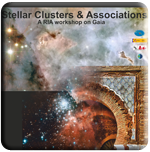Compact Radio Sources within 30" of Sgr A*: Proper Motions, Stellar Winds and the Accretion Rate onto Sgr A*
Yusef-Zadeh, F.; Bushouse, H.; Schödel, R.; Wardle, M.; Cotton, W.; Roberts, D. A.; Nogueras-Lara, F.; Gallego-Cano, E.
The Astrophysical Journal, Volume 809, Issue 1, article id. 10, 20 pp. (2015).
08/2015
ABSTRACT
Recent broadband 34 and 44 GHz radio continuum observations of the Galactic center have revealed 41 massive stars identified with near-IR (NIR) counterparts, as well as 44 proplyd candidates within 30″ of Sgr A*. Radio observations obtained in 2011 and 2014 have been used to derive proper motions of eight young stars near Sgr A*. The accuracy of proper motion estimates based on NIR observations by Lu et al. and Paumard et al. have been investigated by using their proper motions to predict the 2014 epoch positions of NIR stars and comparing the predicted positions with those of radio counterparts in the 2014 radio observations. Predicted positions from Lu et al. show an rms scatter of 6 mas relative to the radio positions, while those from Paumard et al. show rms residuals of 20 mas. We also determine the mass-loss rates of 11 radio stars, finding rates that are on average ˜2 times smaller than those determined from model atmosphere calculations and NIR data. Clumpiness of ionized winds would reduce the mass loss rate of WR and O stars by additional factors of 3 and 10, respectively. One important implication of this is a reduction in the expected mass accretion rate onto Sgr A* from stellar winds by nearly an order of magnitude to a value of a few × {10}-7 {M}⊙ yr-1. Finally, we present the positions of 318 compact radio sources within 30″ of Sgr A*, 45 of which have stellar counterparts in the NIR Ks (2.18 μm) and L‧ (3.8 μm) bands.


